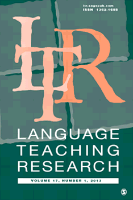
Language Teaching Research
Scope & Guideline
Bridging theory and practice in language teaching.
Introduction
Aims and Scopes
- Empirical Research on Language Learning:
The journal publishes studies that employ various research methodologies including qualitative, quantitative, and mixed-methods approaches to explore language learning processes, outcomes, and strategies. - Teacher and Student Engagement:
A significant focus is on how teacher practices and student engagement impact language learning, including studies on feedback, motivation, and emotional factors in the learning environment. - Innovative Pedagogical Approaches:
Research that investigates innovative teaching methodologies, such as task-based language teaching, technology integration, and collaborative learning, is a core area of interest. - Cultural and Contextual Influences:
The journal highlights the importance of cultural and contextual factors in language education, examining how these elements affect teaching practices and learner experiences. - Assessment and Evaluation:
Studies addressing the effectiveness of assessment methods and their impact on learning outcomes are also prominent, focusing on both formative and summative assessment techniques.
Trending and Emerging
- Emotional and Affective Factors in Learning:
There is a rising interest in exploring the emotional and psychological dimensions of language learning, including studies on anxiety, motivation, and emotional intelligence as they relate to language acquisition. - Technology-enhanced Language Learning:
Research on the integration of technology in language teaching, including online learning environments and digital tools, has gained momentum, reflecting the rapid advancements in educational technology. - Intercultural Competence and Global Citizenship:
The journal is increasingly featuring studies that address intercultural competence and the role of language education in fostering global citizenship, particularly in diverse classroom settings. - Collaborative Learning and Peer Feedback:
Emerging trends emphasize collaborative learning experiences and peer feedback mechanisms as effective strategies for enhancing language proficiency and learner engagement. - Multilingualism and Translanguaging:
The exploration of multilingual practices and translanguaging as pedagogical tools is becoming more prevalent, reflecting a broader understanding of language use in diverse contexts.
Declining or Waning
- Traditional Grammar Instruction:
There has been a noticeable decrease in studies focused on traditional grammar instruction methods, as the field shifts towards more communicative and task-based approaches. - Static Language Proficiency Assessments:
Research centered on static assessments of language proficiency, such as standardized tests without context, is becoming less frequent as a focus on dynamic assessments and learner-centered evaluation gains traction. - One-size-fits-all Approaches:
The journal's recent issues reflect a decline in studies advocating for one-size-fits-all instructional approaches, with a growing emphasis on differentiated and personalized learning strategies.
Similar Journals
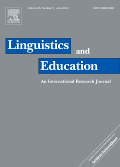
Linguistics and Education
Shaping Educational Policy with Linguistic ExpertiseLinguistics and Education, published by Elsevier, is a premier journal dedicated to advancing the understanding of the intersections between linguistics and educational practices. With its ISSN 0898-5898 and E-ISSN 1873-1864, this journal has established itself as a significant platform since its inception in 1988, continuing to produce impactful research up to 2024. It enjoys a prestigious Q1 ranking in both the Education and Linguistics and Language categories, reflecting its high-quality contributions and leading role in the field. The journal’s Scopus rankings further underscore its influence, being placed in the 87th percentile for Arts and Humanities in Language and Linguistics, and the 86th percentile in Social Sciences in Linguistics and Language. Although it operates under traditional subscription access, its contributions are essential for researchers, professionals, and students alike, making substantial strides in the understanding of language, learning environments, and pedagogical strategies. The journal's objective is to foster interdisciplinary dialogue and disseminate innovative research that informs educational policy and practice.

Didactica-Lengua y Literatura
Cultivating Excellence in Language and Literature PedagogyDidactica-Lengua y Literatura is a premier academic journal dedicated to the nuanced fields of language and literature education, published by the esteemed Universidad Complutense de Madrid. Since its inception in 1989, this Open Access journal has served as a vital platform for disseminating innovative research, methodologies, and pedagogical strategies tailored to educators and researchers alike. With a focus on advancing the teaching and learning of language and literature, Didactica-Lengua y Literatura invites contributions that explore theoretical frameworks, practical applications, and interdisciplinary approaches within the realm of linguistics and literary studies. Perched in the vibrant academic landscape of Spain, this journal not only aims to enhance educational practices but also strives to foster a global dialogue among scholars and practitioners in the field. For those invested in the development and transformation of language and literature education, Didactica-Lengua y Literatura stands as an indispensable resource for insightful and impactful scholarship.

GIST-Education and Learning Research Journal
Advancing Knowledge in Education and LearningGIST-Education and Learning Research Journal, published by INST UNIV COLOMBO AMERICANA-UNICA, stands as a prominent vessel for the dissemination of scholarly research in the field of education and learning. Since its inception in 2007, this open access journal has championed the free exchange of knowledge, allowing researchers, educators, and students from around the globe to contribute to and benefit from the latest findings and practices in educational theory and methodology. With its commitment to enhancing educational practices and influencing policy through rigorous research, GIST-Education and Learning Research Journal invites submissions that explore innovative teaching strategies, learning technologies, educational psychology, and related fields. Its accessibility and dedication to quality research make it an invaluable resource for anyone invested in the improvement of educational outcomes.
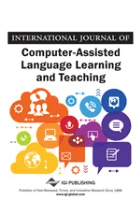
International Journal of Computer-Assisted Language Learning and Teaching
Innovating the future of language learning.Welcome to the International Journal of Computer-Assisted Language Learning and Teaching, a premier publication by IGI Global dedicated to advancing the interdisciplinary research at the intersection of linguistics, education, and computer science. With an ISSN of 2155-7098 and an E-ISSN of 2155-7101, this journal aims to provide a platform for innovative studies on the implementation and effectiveness of technology in language learning and teaching. The journal has earned notable recognition within its field, securing a Q1 ranking in Linguistics and Language and strong placements across several categories in the 2023 Scopus Ranks, including a Q3 classification in Computer Science Applications and Computer Vision and Pattern Recognition. Researchers and educators are encouraged to contribute their findings to foster dialogue around effective computer-assisted methodologies and instructional practices. Although the journal is not open access, it remains a vital resource for researchers, professionals, and students seeking to enhance the efficacy of language education through technological innovation.

Journal of Asia TEFL
Bridging Cultures Through Language EducationWelcome to the Journal of Asia TEFL, a leading peer-reviewed platform dedicated to exploring the intersections of English language education, linguistics, and the dynamic educational landscapes of Asian contexts. Published by ASIA TEFL in South Korea, this journal has emerged as a pivotal resource for academia since its inception in 2004, with consistently expanding influence reflected in its Scopus rankings, including a notable 76th percentile in Linguistics and Language. With a focus on the evolving methodologies and pedagogical innovations in English language teaching, the journal aims to foster scholarly discussions that enhance teaching practices and policy-making in a globalized world. Although it currently operates without open access, its rigor and relevance in categories such as Education and Linguistics ensure that it remains a valuable asset for researchers, educators, and students seeking to advance their knowledge and practice within this vital field of study.

Language Testing in Asia
Empowering research in language testing methodologies.Language Testing in Asia, published by SPRINGERNATURE, is a premier Open Access journal that has carved out a significant niche in the field of linguistics and language assessment. Established in 2011, this journal has rapidly ascended to the top quartile (Q1) in its category, showcasing its impact and relevance in the academic community, with impressive Scopus rankings that place it in the 92nd percentile of Arts and Humanities and 91st percentile in Social Sciences. With a commitment to disseminating high-quality research, the journal aims to provide a platform for innovative studies in language testing, evaluation, and assessment methodologies, particularly in the diverse context of Asia. Its open access policy since 2013 fosters widespread accessibility, ensuring that critical findings and insights reach a broader audience. By focusing on the intersections of language education, assessment practices, and cultural context, Language Testing in Asia is essential for researchers, educators, and policymakers dedicated to advancing the field of language testing.

Journal of Technology and Chinese Language Teaching
Fostering Collaborative Advances in Language EducationJournal of Technology and Chinese Language Teaching, published by JOURNAL TECHNOLOGY & CHINESE LANGUAGE TEACHING, serves as an influential platform for scholars and practitioners in the intersecting fields of technology, language education, and linguistic research. With an ISSN of 1949-260X, this journal strives to disseminate cutting-edge research and innovative practices aimed at enhancing the teaching and learning of Chinese language through technological advancements. Operated from the United States, it currently occupies valuable quartiles within its categories, showcasing its significance—ranking Q4 in Computer Science Applications, Q3 in Education, and Q2 in Linguistics and Language. As it spans from 2019 to 2024, the journal provides a rich repository for international contributions, fostering a collaborative environment for educators, researchers, and students alike. With both Scopus and HIndex metrics reflecting a solid reputation, the Journal of Technology and Chinese Language Teaching is pivotal for those keen on pushing the boundaries of language instruction in the digital age.

Porta Linguarum
Innovating language studies to enhance pedagogical practices.Porta Linguarum, published by UNIV GRANADA in Spain, is a pioneering journal dedicated to the fields of linguistics and language studies, with a dual focus on the educational implications and applications within these disciplines. Launched in 2008 and continuing its impactful contributions into 2024, the journal is recognized for its rigorous peer-reviewed articles that address contemporary language issues, pedagogical approaches, and linguistic research, evidenced by its notable rankings in the 2023 Scopus metrics. Porta Linguarum holds a distinguished Q1 classification in Linguistics and Language, alongside a respectable Q3 placement in Education, marking it as a valuable resource for academics and practitioners alike. With an impressive ranking of 231 out of 1088 in the Arts and Humanities category and a strong 78th percentile ranking for Language and Linguistics, this journal facilitates the exchange of innovative ideas and promotes scholarly discourse. Although currently not adopting an open access model, it remains an essential platform for advancing knowledge in linguistics and education.
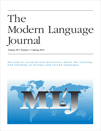
MODERN LANGUAGE JOURNAL
Shaping the Future of Language Learning and TeachingThe MODERN LANGUAGE JOURNAL, published by WILEY, stands as a premier academic resource in the field of linguistics and language studies. With its strong legacy dating back to 1916, this journal has evolved to address contemporary issues and trends in language learning, teaching, and research. It holds a prestigious Q1 ranking in both Linguistics and Language categories as of 2023, reflecting its high impact and relevance in scholarly discourse, supported by notable Scopus rankings that place it in the top percentiles of its field. The journal serves as an essential conduit for researchers, educators, and students seeking to contribute to and stay abreast of advancements in language education and linguistic theory. Although it does not currently offer open access options, the journal remains committed to disseminating significant findings that inspire innovative methodologies within the realm of modern languages.
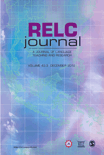
RELC Journal
Exploring the Nexus of Language and LearningRELC Journal, published by SAGE Publications Ltd, stands as a leading platform in the fields of Education and Linguistics, boasting an impressive Q1 ranking in both categories according to the latest metrics. Established in 1970 and continuing its commitment to academic excellence through 2024, the journal features rigorous peer-reviewed research that explores the intersections of language, culture, and pedagogy. With a notable Scopus ranking that places it in the 98th percentile for both Language and Linguistics (Rank #16/1088) and Education (Rank #91/1543), the RELC Journal is essential for scholars, educators, and practitioners seeking to contribute to and stay abreast of cutting-edge developments in their respective fields. Although currently not open access, the journal remains accessible to a diverse audience and invites contributions that challenge conventional perspectives and inspire innovative practices in language education.